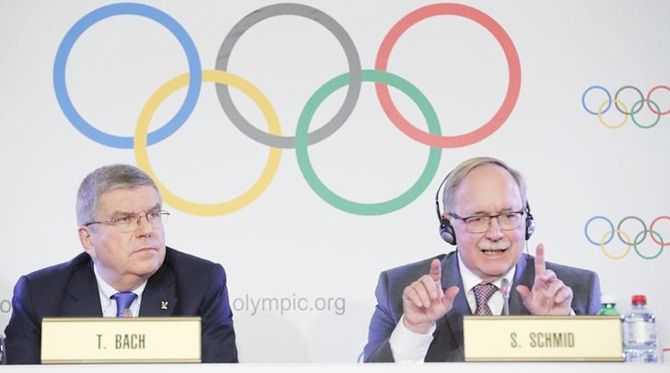 | « Back to article | Print this article |
IOC finds evidence of “unprecedented systematic manipulation” of the anti-doping system.
To protect “innocent athletes” the door has been left open for Russians to compete as an “Olympic Athlete of Russia".
Russia finished top of the medals table at its own 2014 Winter Olympics in Sochi.

Russia has been banned from the 2018 Pyeongchang Winter Olympics after the IOC found evidence of an “unprecedented systematic manipulation” of the anti-doping system that has led to a series of bans for the country’s athletes in recent months.
The International Olympic Committee (IOC) did not impose a blanket ban on Russia ahead of the Rio 2016 Summer Games but said on Tuesday that the evidence unearthed by the Schmid Commission made the doping situation impossible to dispute.
It therefore suspended Russia, which finished top of the medals table at its own 2014 Winter Olympics in Sochi, from next year’s Games in South Korea that run from February 9-25.
However, in a bid to protect “innocent athletes” the door has been left open for Russians to compete as an “Olympic Athlete of Russia”, as long as they satisfy strict conditions that show they have a doping-free background.
The IOC also decided to suspend Russian Olympic Committee (ROC) president Alexander Zhukov as an IOC member, while Russian Deputy Prime Minister Vitaly Mutko, sports minister at the time of the Sochi Games, was also banned from any future participation at the Olympics.
Former Switzerland President Samuel Schmid told a news conference that his report confirmed ”the systematic manipulation of the anti-doping rules and system in Russia.
The results are not based only on testimony by Russia’s former anti-doping chief-turned-whistleblower Grigory Rodchenkov. There is also scientific evidence, witness statements documents and correspondence.
“The facts are that in Russia there was systemic manipulation of doping and the anti-doping system... that also took place at Sochi 2014,” added Schmid.
IOC President Thomas Bach said: ”Today we gave the Russian delegation the opportunity to express themselves. In this meeting this afternoon the president of ROC (Russian Olympic Committee) has apologised.
“As a former athlete I am feeling very sorry for all the clean athletes who are suffering from this manipulation... but because we are allowing clean athletes to participate they can set about building a bridge for the future (rather) than erecting a new wall between Russia and the Olympic movement.”
Zhukov described the IOC decision as contradictory. “There are positive and negative sides,” he said. “The IOC has allowed all clean athletes in all sports.”

Other Russians were more forthright, with Alexei Kravtsov, president of the Russian Skating Union, saying: ”The decision is offensive, insulting and completely unjustified.
“I consider that this decision will deal a great blow to the whole Olympic movement.”
Alexei Kurashov, president of the Russian freestyle federation, added: ”The Olympic movement has discredited itself and there will be fundamental consequences to this.
“These are not the principles of Olympism. I can’t say that the activities of the IOC are honest.”
The IOC’s decision comes 18 months after it decided not to impose an outright ban on Russian athletes ahead of Rio and told international sports federations to decide individually on the participation of Russians at the Olympics in Brazil.
While all of Russia’s track and field athletes bar one and the weightlifting team were banned from Rio, about 70 percent of Russia’s original 387-strong squad took part at those Games.
Bach said on Tuesday, however, that the situation was different now.
“(Ahead of Rio) there was no opportunity to hear the Russian side and at the time of Rio it was mainly about the failure in the Moscow lab. Now it’s about the manipulation of an Olympic lab. The conditions then and now are totally different.”
The Schmid report said the IOC had “not found any documented, independent and impartial evidence confirming the support or the knowledge of this (anti-doping manipulation) system by the highest State authority” after Richard McLaren’s independent report for the World Anti-Doping Agency (WADA) had said the Russian government and secret service were involved.
McLaren’s report in 2016 found more than 1,000 Russian competitors in over 30 sports had been involved in a conspiracy to conceal positive drug tests over a five-year period.
